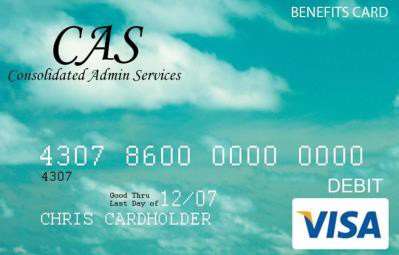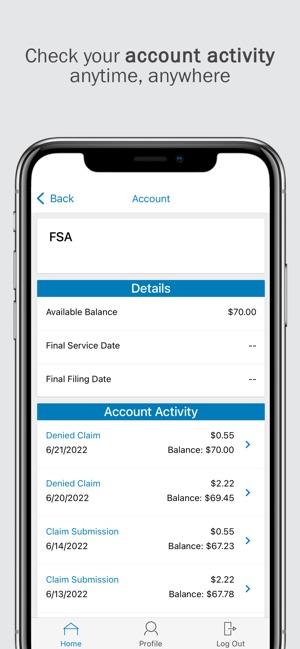Flexible Spending (FSA)
Flexible Spending Accounts (FSA) allow you to designate a set amount of money and have it taken out of each paycheck and deposited into an account to be used for specific expenses. Federal Income and Social Security taxes will not be withheld from your contributions, making your taxable income lower. You may enroll in the Healthcare FSA for medical, dental, vision, pharmacy, and other related expenses and / or the Dependent Care FSA, primarily for dependent day care expenses. Consolidated Admin Services (CAS) is the administrator for your FSA plans.
Healthcare FSA accounts are limited to $3,400 per year for 2026 per employer. If you're married, your spouse can contribute up to the max their employer allows as well.
For Dependent Care FSAs, you may contribute up to $7,500 if you are married and filing a joint return, or if you are a single parent. If you are married and filing separately, you may contribute up to $3,750 per year per parent.
Use the money in these accounts to pay for eligible out-of-pocket healthcare (medical, dental, vision expenses) and dependent care (day care) expenses for yourself, your spouse, your children or for any person you claim as a dependent on your federal income tax return.
Remember to carefully estimate your plan year expenses when making an election. Typically, you must use all of the funds in your account by the end of the plan year or the money is forfeited per the IRS regulations.
2026 Plan Year Maximums
- Healthcare FSA: $3,400
- Dependent Care FSA: $7,500
Important Termination and Retirement Information:
Please note: if you terminate employment or retire, eligible FSA claims must be incurred prior to your benefits-end date, regardless of your FSA balance.
Healthcare FSA
Eligible Healthcare FSA expenses for you and your taxable dependents include deductibles, copays, coinsurance, prescription drugs, over-the-counter drugs (no prescription required), dental, and vision expenses. Certain over-the-counter (OTC) medications and supplies are eligible for reimbursement without requiring a prescription. A list of eligible vs. ineligible expenses is available on the Resources page.
You are not eligible to participate in the Healthcare Flexible Spending Account (FSA) plan if you are currently enrolled in a Health Savings Account (HSA).
Dependent Care FSA
If your spouse is not employed, your dependent care expenses are not eligible for reimbursement unless your spouse is a full-time student or is physically or mentally incapable of caring for himself / herself.
Eligible childcare providers can be individuals, such as a family member or friend. However, it's important to note that this category excludes individuals under the age of 19 who are related to you, including your own child or stepchild. Additionally, the caregiver cannot be someone whom you list as a dependent on your federal tax return.
To claim reimbursements for dependent care through this FSA, you must ensure that the service provider has either a federal tax ID number or a valid social security number. This documentation is essential to facilitate the reimbursement process.
Eligible Expenses Must Be for the Care of:
- A dependent child who is under age 13 and whom you claim as an exemption on your tax return
- A dependent child, elderly parent, or relative who is physically or mentally incapable of caring for himself or herself
Convenient Debit Cards
Debit Card Purchases
FSA participants receive a CAS Visa debit card to make it easy to pay for eligible services and products. When you use the card, payments are automatically withdrawn from your account. When you use your debit card, it is important to retain all receipts. Most expenses can be validated through the card transaction, but you may need to provide receipts for certain transactions. When the debit card is not accepted by physicians or pharmacies, you are required to pay for the expense and submit a claim for reimbursement.

Manual Claims
Not all vendors accept the debit card. Should you need to pay for an eligible expense and be reimbursed from your FSA, you will need to submit a claim for that reimbursement.
Use It or Lose It
Before you enroll, you must first decide how much you would like to contribute to your accounts. It’s important that you estimate your anticipated eligible expenses for the plan year before enrolling.
Claims must be incurred by December 31 to be eligible for reimbursement for the plan year. The IRS requires that any unused money in your account at the end of the plan year is retained by your employer and forfeited by the employee.
IRS regulations require appropriate documentation to ensure your claims are valid expenses. You will be asked to provide receipts as documentation for most expenses. Retain receipts and provide them promptly upon request.
Secure Member Portal and Mobile App
You’ll receive access to a secure easy-to-use member portal where you can track your balance, view your claims, and submit claims for reimbursement. It’s important for FSA members to manage your account using the member portal.
You may also access your FSA account details through your mobile device with the Consolidated Administrative Services app. On the app, you can access your account details, and claims and documentation may be easily submitted using your phone.

